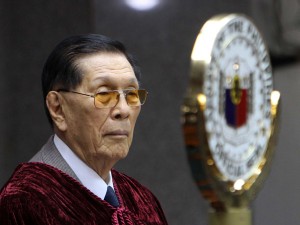MANILA, Philippines—Senate President Juan Ponce Enrile’s disclosure of Ambassador Sonia Brady’s purported notes of her meeting with Senator Antonio Trillanes IV on the disputed Panatag Shoal may have “compromised” national interest, a University of the Philippines law professor said Saturday.
“That was really intended to be a secret. That compromised national interest,” Harry Roque, director of the UP Law Center’s Institute of International Legal Studies, said by phone.
By disclosing the Brady notes, Enrile also bared the extent of Trillanes’ involvement in back-channel negotiations with China over the shoal in the West Philippine Sea, and the latter’s position on the territorial dispute, Roque said.
“The extent of involvement of Trillanes should have remained confidential. There were also details on the position taken by Trillanes, and the words he allegedly said. Those are absolutely confidential,” he said when asked how the disclosure compromised national interest.
This, Roque said, was tantamount to revealing state secrets. He believed this was not covered by parliamentary immunity.
“We can’t show our weak points to the other party. Diplomacy is like poker. Why show your cards to the other party? You may have disagreements with your colleagues, but you should distinguish between an internal dispute and national interest,” he said. “The Chinese don’t need spies if our government officials declassify secret documents.”
The notes were presumed to be regular and authentic since these were received as official communication by the Senate President, Roque said.
After tangling with Trillanes over a bill last Wednesday, Enrile read into the Senate records of Brady’s diplomatic notes that, Enrile said, suggested Trillanes was working to advance China’s interests and was undermining the Philippine position on the dispute.
Trillanes, who was approached by Chinese officials to serve as back-channel negotiator, volunteered to help defuse the standoff between Philippine and Chinese navies at the shoal (also called Scarborough Shoal) in April, officials said.
President Benigno Aquino on Friday acknowledged Trillanes’ contribution to the de-escalation of tensions, saying that he opened a channel of communication with Chinese officials.
Former Solicitor-General Frank Chavez, however, had a different view.
“If you base it on what was disclosed, there was nothing explosive,” he said by phone. “Those are notes taken by a government functionary for future use if there is any disavowal of any matter being discussed. I see nothing that would breach national security there.”
Malacañang sidestepped questions on the implications of Enrile’s disclosure of Brady’s notes.
“We don’t know yet if those were the contents of the Brady notes because we also don’t have access to those documents. I am not competent to compare because I have not seen the original or the notes of Ambassador Brady,” Abigail Valte, one of President Aquino’s spokespersons, said over government-run dzRB.
Malacañang also saw no need to summon Brady over the notes disclosed by Enrile.
“Ambassador Brady is recovering from a stroke. We do not wish to add to her burdens,” Strategic Communication Secretary Ricky Carandang said in a text message.
Meanwhile, Valte said Trillanes’ fate as a government backroom negotiator lay in the hands of the President.
“That will depend on the President,” she said when asked in the radio interview if the President still needed the services of a backroom negotiator like Trillanes. “That’s usually assessed on a case to case basis and ultimately it will be the President who will be making that decision.”


